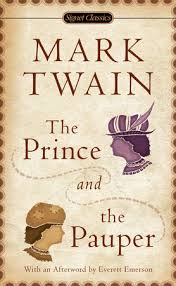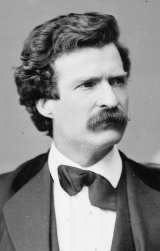The Prince and the Pauper Page #14
The Prince and the Pauper is a novel by American author Mark Twain. It was first published in 1881 in Canada, before its 1882 publication in the United States. The novel represents Twain's first attempt at historical fiction.
Arrived at the Dowgate, the fleet was towed up the limpid Walbrook (whose channel has now been for two centuries buried out of sight under acres of buildings) to Bucklersbury, past houses and under bridges populous with merry-makers and brilliantly lighted, and at last came to a halt in a basin where now is Barge Yard, in the centre of the ancient city of London. Tom disembarked, and he and his gallant procession crossed Cheapside and made a short march through the Old Jewry and Basinghall Street to the Guildhall. Tom and his little ladies were received with due ceremony by the Lord Mayor and the Fathers of the City, in their gold chains and scarlet robes of state, and conducted to a rich canopy of state at the head of the great hall, preceded by heralds making proclamation, and by the Mace and the City Sword. The lords and ladies who were to attend upon Tom and his two small friends took their places behind their chairs. At a lower table the Court grandees and other guests of noble degree were seated, with the magnates of the city; the commoners took places at a multitude of tables on the main floor of the hall. From their lofty vantage-ground the giants Gog and Magog, the ancient guardians of the city, contemplated the spectacle below them with eyes grown familiar to it in forgotten generations. There was a bugle-blast and a proclamation, and a fat butler appeared in a high perch in the leftward wall, followed by his servitors bearing with impressive solemnity a royal baron of beef, smoking hot and ready for the knife. After grace, Tom (being instructed) rose--and the whole house with him--and drank from a portly golden loving-cup with the Princess Elizabeth; from her it passed to the Lady Jane, and then traversed the general assemblage. So the banquet began. By midnight the revelry was at its height. Now came one of those picturesque spectacles so admired in that old day. A description of it is still extant in the quaint wording of a chronicler who witnessed it: ‘Space being made, presently entered a baron and an earl appareled after the Turkish fashion in long robes of bawdkin powdered with gold; hats on their heads of crimson velvet, with great rolls of gold, girded with two swords, called scimitars, hanging by great bawdricks of gold. Next came yet another baron and another earl, in two long gowns of yellow satin, traversed with white satin, and in every bend of white was a bend of crimson satin, after the fashion of Russia, with furred hats of gray on their heads; either of them having an hatchet in their hands, and boots with pykes’ (points a foot long), ’turned up. And after them came a knight, then the Lord High Admiral, and with him five nobles, in doublets of crimson velvet, voyded low on the back and before to the cannell-bone, laced on the breasts with chains of silver; and over that, short cloaks of crimson satin, and on their heads hats after the dancers’ fashion, with pheasants’ feathers in them. These were appareled after the fashion of Prussia. The torchbearers, which were about an hundred, were appareled in crimson satin and green, like Moors, their faces black. Next came in a mommarye. Then the minstrels, which were disguised, danced; and the lords and ladies did wildly dance also, that it was a pleasure to behold.’ And while Tom, in his high seat, was gazing upon this ‘wild’ dancing, lost in admiration of the dazzling commingling of kaleidoscopic colours which the whirling turmoil of gaudy figures below him presented, the ragged but real little Prince of Wales was proclaiming his rights and his wrongs, denouncing the impostor, and clamouring for admission at the gates of Guildhall! The crowd enjoyed this episode prodigiously, and pressed forward and craned their necks to see the small rioter. Presently they began to taunt him and mock at him, purposely to goad him into a higher and still more entertaining fury. Tears of mortification sprang to his eyes, but he stood his ground and defied the mob right royally. Other taunts followed, added mockings stung him, and he exclaimed-- “I tell ye again, you pack of unmannerly curs, I am the Prince of Wales! And all forlorn and friendless as I be, with none to give me word of grace or help me in my need, yet will not I be driven from my ground, but will maintain it!” “Though thou be prince or no prince, ’tis all one, thou be’st a gallant lad, and not friendless neither! Here stand I by thy side to prove it; and mind I tell thee thou might’st have a worser friend than Miles Hendon and yet not tire thy legs with seeking. Rest thy small jaw, my child; I talk the language of these base kennel-rats like to a very native.” The speaker was a sort of Don Caesar de Bazan in dress, aspect, and bearing. He was tall, trim-built, muscular. His doublet and trunks were of rich material, but faded and threadbare, and their gold-lace adornments were sadly tarnished; his ruff was rumpled and damaged; the plume in his slouched hat was broken and had a bedraggled and disreputable look; at his side he wore a long rapier in a rusty iron sheath; his swaggering carriage marked him at once as a ruffler of the camp. The speech of this fantastic figure was received with an explosion of jeers and laughter. Some cried, “‘Tis another prince in disguise!” “‘Ware thy tongue, friend: belike he is dangerous!” “Marry, he looketh it--mark his eye!” “Pluck the lad from him--to the horse-pond wi’ the cub!” Instantly a hand was laid upon the Prince, under the impulse of this happy thought; as instantly the stranger’s long sword was out and the meddler went to the earth under a sounding thump with the flat of it. The next moment a score of voices shouted, “Kill the dog! Kill him! Kill him!” and the mob closed in on the warrior, who backed himself against a wall and began to lay about him with his long weapon like a madman. His victims sprawled this way and that, but the mob-tide poured over their prostrate forms and dashed itself against the champion with undiminished fury. His moments seemed numbered, his destruction certain, when suddenly a trumpet-blast sounded, a voice shouted, “Way for the King’s messenger!” and a troop of horsemen came charging down upon the mob, who fled out of harm’s reach as fast as their legs could carry them. The bold stranger caught up the Prince in his arms, and was soon far away from danger and the multitude. Return we within the Guildhall. Suddenly, high above the jubilant roar and thunder of the revel, broke the clear peal of a bugle-note. There was instant silence--a deep hush; then a single voice rose--that of the messenger from the palace--and began to pipe forth a proclamation, the whole multitude standing listening. The closing words, solemnly pronounced, were-- “The King is dead!” The great assemblage bent their heads upon their breasts with one accord; remained so, in profound silence, a few moments; then all sank upon their knees in a body, stretched out their hands toward Tom, and a mighty shout burst forth that seemed to shake the building--
Translation
Translate and read this book in other languages:
Select another language:
- - Select -
- 简体中文 (Chinese - Simplified)
- 繁體中文 (Chinese - Traditional)
- Español (Spanish)
- Esperanto (Esperanto)
- 日本語 (Japanese)
- Português (Portuguese)
- Deutsch (German)
- العربية (Arabic)
- Français (French)
- Русский (Russian)
- ಕನ್ನಡ (Kannada)
- 한국어 (Korean)
- עברית (Hebrew)
- Gaeilge (Irish)
- Українська (Ukrainian)
- اردو (Urdu)
- Magyar (Hungarian)
- मानक हिन्दी (Hindi)
- Indonesia (Indonesian)
- Italiano (Italian)
- தமிழ் (Tamil)
- Türkçe (Turkish)
- తెలుగు (Telugu)
- ภาษาไทย (Thai)
- Tiếng Việt (Vietnamese)
- Čeština (Czech)
- Polski (Polish)
- Bahasa Indonesia (Indonesian)
- Românește (Romanian)
- Nederlands (Dutch)
- Ελληνικά (Greek)
- Latinum (Latin)
- Svenska (Swedish)
- Dansk (Danish)
- Suomi (Finnish)
- فارسی (Persian)
- ייִדיש (Yiddish)
- հայերեն (Armenian)
- Norsk (Norwegian)
- English (English)
Citation
Use the citation below to add this book to your bibliography:
Style:MLAChicagoAPA
"The Prince and the Pauper Books." Literature.com. STANDS4 LLC, 2025. Web. 6 Feb. 2025. <https://www.literature.com/book/the_prince_and_the_pauper_315>.








Discuss this The Prince and the Pauper book with the community:
Report Comment
We're doing our best to make sure our content is useful, accurate and safe.
If by any chance you spot an inappropriate comment while navigating through our website please use this form to let us know, and we'll take care of it shortly.
Attachment
You need to be logged in to favorite.
Log In